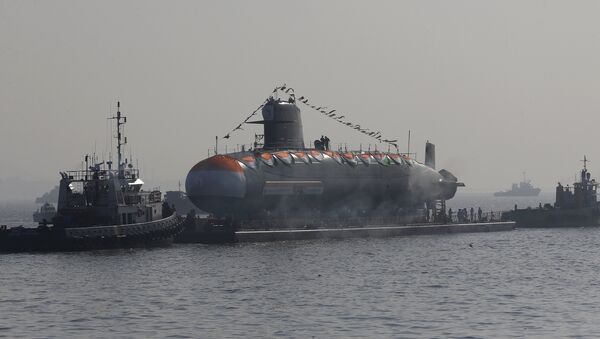New Delhi (Sputnik) – India’s P75I project envisages the local manufacturing of six diesel-electric propulsion submarines by the country’s private defense firms, in collaboration with global leaders in the sector.
The Indian Navy issued a request for information (RFI) on July 19 to six global firms including Japan’s Mitsubishi Heavy Industries and Kawasaki Heavy Industries, as well as Spain’s Navantia. They were to respond by October 15, 2017 but the Spanish and Japanese firms did not do so. The firms from Russia, France, Germany, and Sweden are now left in the competition for the project.
With addition of #Scorpeneclasssubmarine @indiannavy will flex it's muscles. India will also develop six scorpene submarines. pic.twitter.com/fd60epsYj0
— Dhanraj Nathwani (@DhanrajNathwani) 13 сентября 2017 г.
Defense sources told Sputnik that France’s Naval Group (DCNS), though a global leader in submarine manufacturing, is unlikely to bag the project owing to the Scorpene submarine data-leak controversy and that the project will go to either the Russian or the German firm.
READ MORE: India’s Second Scorpene Advanced Attack Submarine Misses Induction Deadline
The $7.8 billion project is set to be executed along the lines of India’s newly-formulated strategic partnership model that stipulates collaboration between one of India’s private defense shipbuilders and a foreign manufacturer. In the RFI, the Indian Navy had asked the selected manufacturers to provide operational details of their respective submarines with air-independent propulsion systems (AIP) and anti-surface, anti-submarine and land-attack capabilities.
#India begins deployment of submarine in the #IndianOcean region after a long gap https://t.co/UdHbYlWzBy #submarines pic.twitter.com/8SLVToTfrb
— Sputnik (@SputnikInt) 21 сентября 2017 г.
"The Indian Navy had asked in its document to provide operational details of the proven product. So, the companies from Japan & Spain do not qualify for the project," Commodore Ranjit B Rai (retired), Indian Navy told Sputnik.
INS Kalvari, 1st of 6 Scorpene submarines finally delivered to Navy. India needs at least 18 diesel-electric subs but has only 13 old ones pic.twitter.com/9ElhXCLcFx
— Rajat Pandit (@rajatpTOI) 21 сентября 2017 г.
Commodore Anil Jai Singh, former Indian Navy officer and vice president of Indian Maritime Foundation told Sputnik that India’s strategic partnership model, which stipulates the transfer of technology (ToT), has not gone down well with Japan, unlike other friendly countries.
READ MORE: India Looks for New Partner to Arm its Scorpene Class Submarine
The Indian Navy is expected to issue the request for proposal for the project only after 2019 and if everything goes according to plan, it will take another seven to eight years for the submarines to be finally available to the Indian Navy.
First Of 6 Scorpene-Class Submarines, Kalvari, Handed Over To Navy https://t.co/ndFo9ybc89 #news #India pic.twitter.com/QWTX9jGqDk
— Indian 24 News (@indian24news) 21 сентября 2017 г.
Presently, the Indian Navy has 13 diesel-electric submarines in service – 9 Kilo-class and four Shishumar (Type 209/1500) — class, but only half of them are operational at a time.


